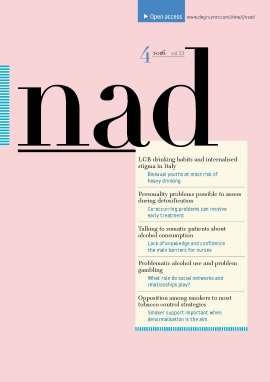NAD 4/2016 (October)

Exploring smokers’ opposition to proposed tobacco control strategies
Smokers are in favour of legislation that targets passive smoking, but defend their right to smoke in most public spaces. According to Marianne Lund, smokers opposed most of the proposed tobacco control strategies. Their support may be more important in tobacco control areas that aim to denormalise smoking and where enforcement is more complex. Helen Keane and Tove Sohlberg have written commentaries.
Risky drinking among Norwegian students
Solbjørg Makalani Myrtveit and colleagues investigate whether participation in the introductory week at Norwegian universities is associated with risky drinking. They also investigate whether risky drinking is associated with academic performance.
Factors influencing whether nurses talk to somatic patients about their alcohol consumption
Many Danes drink so much that it is detrimental to their health. As they are at risk of suffering diseases which can lead to hospitalisation on somatic wards, hospitals are ideal arenas for identifying individuals whose alcohol consumption is excessive. Rikke Hellum, Lene Bjerregaard and Anette Søgaard Nielsen identify potential factors that influence whether or not nurses talk to patients about their alcohol consumption on somatic wards. They also examine whether a screening project may affect the nurses’ readiness to talk about alcohol use with their patients.
Assessment of personality problems among patients with substance use disorders
Several studies have shown that personality disorders are frequently occurring among patients with substance use disorders. Ingebjørg Aspeland Lien and Espen Ajo Arnevik explore whether personality problems might be assessed among SUD patients in early stages of treatment.
Binge drinking and internalised sexual stigma among Italian lesbian, gay and bisexual young adults
Lesbian, gay and bisexual (LGB) young people are at increased risk to develop alcohol-related problems compared to heterosexuals. Valeria Verrastro and colleagues describe alcohol use patterns in relation to alcohol expectancies, internalised sexual stigma and sensation seeking and to highlight the specific risk factors that sexual minority subgroups face.
Problematic alcohol use and problem gambling
This study by Johanna Nordmyr, Anna K. Forsman and Karin Österman explores associations between structural and functional aspects of social networks and relationships (social ties) among individuals exhibiting problematic alcohol use and problem gambling, respectively. Functional aspects of individual-level social ties appear to be more relevant when studying problematic alcohol use or problem gambling, similarly to other forms of mental health problems.
Empowered communities: Science, ideology and the limits of political action
Filip Roumeliotis investigates how empowerment and democratic participation are conceptualized in the drug prevention program ‘Communities that Care’. The analysis is based on 13 publications written by program developers and other collaborators. He argues that the program may exert ‘ideological closure’ on the ability of communities to speak in properly political terms through disciplining communities into a common language that assert primacy of a (particular brand of) scientific reasoning.
Follow us on social media:

